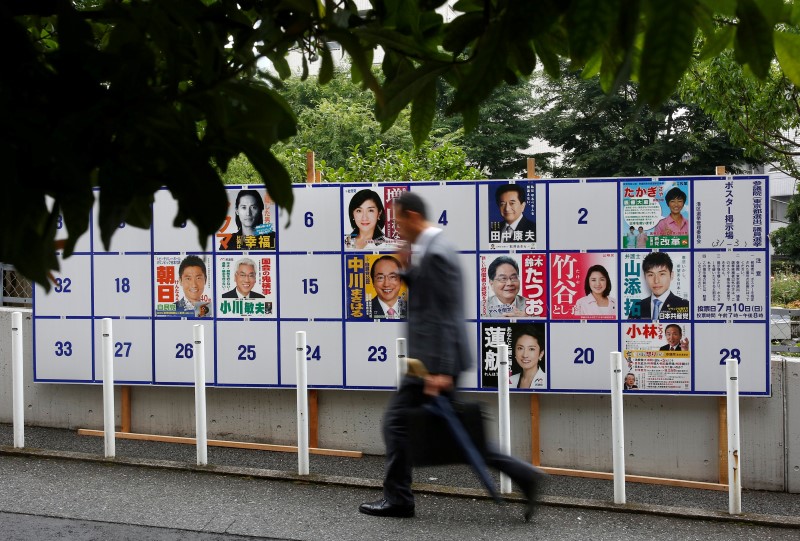By Linda Sieg
TOKYO (Reuters) - Japanese Prime Minister Shinzo Abe began an upper house election campaign on Wednesday with a pledge to rev-up the economy as surveys showed his ruling bloc ahead, despite doubts over Abe's growth recipe and his push to revise the pacifist constitution.
Abe's coalition is in no danger of losing power in the election but he needs a solid win to keep his Liberal Democratic Party (LDP) lawmakers in line and perhaps stay on another three years after his tenure as LDP president expires in 2018.
Abe is casting the July 10 election for half the seats in the 242-member chamber as a referendum on his decision to delay a planned hike in an unpopular sales tax and his "Abenomics" recipe of hyper-easy monetary policy, spending and reform.
"This is an election to decide whether we will forge ahead strongly with economic policies, make Japan grow, the regions proper and everyone feel the benefits -- or return to a dark and stagnant era," Abe told a crowd in Kumamoto, southern Japan.
The area was hit by a deadly earthquake in April and this week has been battered by heavy rains, leaving at least six people dead.
The opposition Democratic Party is arguing that Abenomics has increased social disparities and attacking Abe's long-held goal of revising the postwar constitution.
"We must stop Abe's runaway politics," Democratic Party leader Katsuya Okada told voters in Yamanashi, central Japan.
Surveys show about twice as many voters plan to vote for Abe's LDP as for the Democratic Party, but also show support for Abe and his party slipping amid growing doubt about his efforts to revive the economy.
LIMP TURNOUT, TEEN VOTE
Turnout is expected to be weak after hitting a record low of 52.6 percent in a 2013 upper house vote. About 2.4 million Japanese aged 18 and 19 can vote for the first time, although young voters are not expected to turn out in large numbers.
The expected victory for the ruling bloc is thus more likely to be a vote of no-confidence in the opposition than a groundswell of support for Abe.
"Abenomics is not working out well and Abe's security policies are not popular. You'd think he'd be vulnerable," said Jeffrey Kingston, director of Asia studies at Temple University's Japan campus.
"But the opposition is weak and discredited."
Some analysts, however, said the LDP could lose some of the 51 seats it held among those up for grabs, thanks to a historic move by opposition parties to join hands.
The Democratic Party and three smaller parties, including the Japanese Communist Party, are backing unified candidates in 32 single-seat districts, and have support from grassroots groups opposed to Abe's hawkish security policies and drive to revise the constitution.
But regaining public trust will be tough for the Democrats after a 2009-2012 tenure many remember for infighting and unkept promises.
Abe has set a target for his coalition of winning a majority of the 121 seats being contested.
The premier has said the ruling bloc hopes to win a two-thirds majority with like-minded opposition parties to open the path to revising the constitution, but has recently played down that target.

Surveys show a majority of voters see no need to change the charter, which conservatives see as an obstacle to beefing up defense and a humiliating symbol of defeat in World War Two.